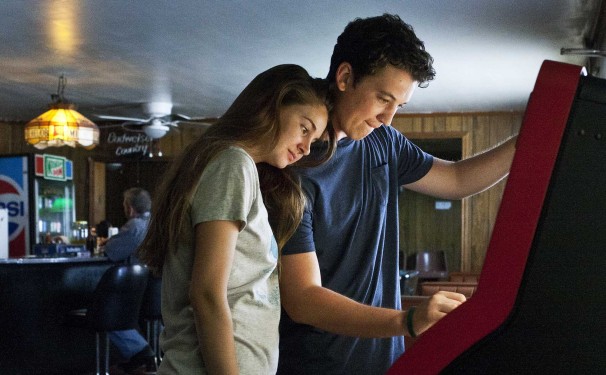 I recently saw an advanced screening of the film The Spectacular Now. This honest and moving film is based on Tim Tharp’s YA novel (which also happens to be a National Book Award Finalist). The story follows Sutter Keely (Miles Teller), a high school senior determined to live in the present and forget the future, as he stumbles from one good time to the next. With a flask in one hand and his happy-go lucky attitude in the other, Sutter gets involved with the sweet and shy, Aimee (Shailene Woodley). But disaster is coming … because who can live in the present moment forever?
I recently saw an advanced screening of the film The Spectacular Now. This honest and moving film is based on Tim Tharp’s YA novel (which also happens to be a National Book Award Finalist). The story follows Sutter Keely (Miles Teller), a high school senior determined to live in the present and forget the future, as he stumbles from one good time to the next. With a flask in one hand and his happy-go lucky attitude in the other, Sutter gets involved with the sweet and shy, Aimee (Shailene Woodley). But disaster is coming … because who can live in the present moment forever?
I’m going to try really hard not to spoil this movie (because you really should go see it). But what I want to talk about is the film’s uncanny ability to build tension based on the audience’s expectation of impending disaster… and then, never fulfilling that expectation.
Let me give you an example: If I show you a character who’s an alcoholic and then I hand that character the keys to a fancy new car, what do you expect to see happen in the next scene?
A car crash of course.
This is a classic example of reader interaction. Readers love to guess what is going to happen next. It builds tension. It gets the reader involved as a participant in the story. It’s fun to wonder what will come next! But a great story doesn’t usually fulfill that expectation. It exceeds it. This is where crazy plot twists come from. The reader thinks a plot will go one way, and then — BAM! — it zags in a whole other direction. What a thrill!
Only, The Spectacular Now doesn’t really do that either.
It doesn’t try to up the ante with a new twist or an even bigger payoff. In fact, the film doesn’t like to payoff the viewer’s expectation at all. Sure, this sounds absolutely frustrating, but in actuality it’s surprisingly fulfilling and honest. Because how often does disaster really strike in our lives? Yes, we are always afraid of it (and that’s the exact expectation the story is playing on), but I bet most of us would agree that our lives are never as intense or dramatic as a film or novel. It’s the fear of what’s coming that scares us. And that turns out to be the primary tension of the movie. Disaster is hanging out there, somewhere in the future, but the future is what the protagonist is trying so hard to avoid. It’s brilliant, and at the same time, there’s something insanely dramatic and fascinating in Sutter’s ability to avoid it!
I wanted to bring this up because I feel like stories far too often choose the dramatic disaster. This is particularly hard to avoid when films overwhelm us with explosions and fights to the death. But I think there’s room to make writing choices without the spectacle. Choices that can be just as powerful. Choices that might actually be more honest and fulfilling because they don’t “go there.” I feel like so much of our lives (our real lives, not fictional character lives) are built on the tension of unfulfilled promises and that space between living in the now and looking toward the future. That feeling – that’s what The Spectacular Now so beautifully captures. And frankly, its one of the best films I’ve seen in a long time.
Go see it.



So well said, Ingrid. It reminds me of Hitchcock and this views on suspense. If there is a bomb under the table, a scene’s tension will be heightened, the purpose accomplished. The bomb does not need to explode. It might for other reasons. But not for suspense. An explosion only diffuses the tension.
Great post! I love the unfulfilled expectations aspect though an author takes a gamble with thwarting a reader’s expectations. i like to guess what will happen, as you mention, but I don’t always want what I guess to come to pass. I like a surprise that feels inevitable. I need to see this movie!